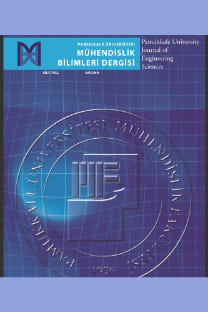Çok Katlı Yapılarda Uniform Olmayan Burulma Nedeniyle Oluşan Tesirlerin Belirlenmesi için Bir Yöntem
Bu çalışmada, yüksek yapılarda yatay yükler etkisinde oluşan, Vlasov uniform olmayan burulması nedeniyle taşıyıcı yapı elemanlarda oluşan tesirlerin belirlenmesi için bir yöntem önerilmiştir. Bu yöntemde, mevcut yöntemlerde yapıya yüksekliği boyunca uniform yayılı bir yatay yük etkimesi kabulü yerine, daha gerçekçi olan kat seviyelerinde farklı büyüklüklere sahip yatay yüklerin etkimesi kabulü yapılmıştır. Önerilen yöntemde, herhangi bir enkesitin kesit özelliklerinin hesaplandığı ve birim çapılma diyagramının çizildiği bir algoritma hazırlanmış ve bu algoritma MATHCAD programında yazılmış ve böylece zaman alıcı diferansiyel denklem çözümüne gerek kalmadan kısa sürede sonuçların elde edilmesi sağlanmıştır. Yöntem Taranath, Smith ve Coull'un çalışmaları ile karşılaştırılmış, hassaslığını tespit için konsol bir kiriş ele alınarak ANSYS ve CONSTEEL analiz programları ile karşılaştırma yapılmıştır.
Anahtar Kelimeler:
Uniform burulma, Uniform olmayan burulma, Çarpılma burulması, Yüksek yapılarda çarpılma, Taşıma matrisi
A method to Determine the Effects of Nonuniform Torsion on Tall Buildings
In this paper, a method is presented to determine the effects of Vlasov nonuniform torsion caused by horizontal loads on structural systems of tall buildings. In this method, a realistic assumption is made that the variable horizontal loads act at each story level instead of a uniform lateral load along the height of building. For the presented method, an algorithm is prepared in software MATHCAD in which the cross-sectional characteristics are calculated and the sectorial coordinate diagram is plotted. The results can be obtained in a short time, hence it is not needed to solve the time consuming differential equations. The method is compared with the studies of Taranath and Smith & Coul, and is also compared with the softwares ANSYS and CONSTEEL by modeling as a cantilever beam to check the accuracy of the algorithm.
Keywords:
Uniform torsion, Nonuniform torsion, Warping torsion, Warping effect on tall buildings, Transfer matrix,
___
- Smith BS, Coull A. Tall Building Structures: Analysis and Design, 1st ed. New York, USA, Wiley, 1991.
- Vasquez J, Riddell R. "Thin-Walled Core Element for Multistory Buildings". Journal of Structural Engineering, 110(5), 1021-1034, 1984.
- Chen M, Jolissaint DE. "Pure and Warping Torsion Analysis of Rigid Frames". Journal of Structural Engineering, 109(8), 1999-2003, 1983.
- Chen H, Liew JR, Shanmugam NE. "Nonlinear Inelastic Analysis of Building Frames With Thin-Walled Cores". Thin Walled Structures, 37(3), 189-205, 2000.
- Doğruer OY, Tüfekçi E. “Çember Eksenli Sabit Kesitli Dışı Çubukların İTÜ Dergisi/d, 6(2), 53-62, 2007. Serbest Titreşimleri”.
- Timochenko S, Goodie JN. Theory of Elasticity, 2nd ed. New York, USA, McGraw-Hill, 1951.
- Chajes A. Principles of Structural Stability Theory, USA, Prentice-Hall, 1974.
- Yang YB. Linear and Nonlinear Analysis of Space Frames With Nonuniform Torsion Using Intreactive Computer Graphics. PhD Thesis, Cornell University, USA, 1984.
- Hoogenboom PCJ.
- “Wringing-CT5141_chap7.pdf”.
- http://homepage.tudelft.nl/p3r3s/CT5141_chap7.pdf (08.02.2014).
- Baber T. “Torsion in Structural Desing–torsion pdf”. http://people.virginia.edu/~ttb/torsion.pdf (16.01.2014).
- Trahair NS. "Nonlinear Elastic Nonuniform Torsion". Journal of Structural Engineering, 131(7), 1135-1142, 2005.
- Galambos TV. Structural Members and Frames. New Jersey, USA, Prentice Hall, 1968.
- Murray NW. Introduction to the Theory of Thin-Walled Structures, Oxford, UK, Clarendon Press, 1984.
- Seaburg PA, Carter CJ. Torsional Analysis of Structural Steel Members, USA, AISC, 1997.
- ISSN: 1300-7009
- Başlangıç: 1995
- Yayıncı: PAMUKKALE ÜNİVERSİTESİ
Sayıdaki Diğer Makaleler
Süleyman ORHAN, Mehmet ÖZYAZICIOĞLU
SONLU ELEMANLAR YÖNTEMİYLE TARİHİ ERZURUM LALA PAŞA CAMİ'NİN YAPISAL DAVRANIŞININ İNCELENMESİ
Ferit ÇAKIR, Burçin Şenol ŞEKER, Adem DOĞANGÜN, Ahmet DURMUŞ
Çok Katlı Yapılarda Uniform Olmayan Burulma Nedeniyle Oluşan Tesirlerin Belirlenmesi için Bir Yöntem
Tuncay AYDOĞUŞ, Güliz BAYRAMOĞLU, Alpay ÖZGEN
Sonlu Elemanlar Yöntemiyle Tarihi Erzurum Lala Paşa Cami’nin Yapısal Davranışının İncelenmesi
Burçin ŞEKER, Ferit ÇAKIR, Adem DOĞANGÜN, Ahmet DURMUŞ
Makine Öğrenmesi Yöntemlerinin İnşaat Sektörüne Katkısı: Basınç Dayanımı Tahminlemesi
Rijit Döşeme Varsayımının Perde Duvarlarda Oluşan Kesme Kuvvetlerine Etkisi
Vlasov Zeminine Oturan Yapıların Zaman Tanım Alanında Analizi
